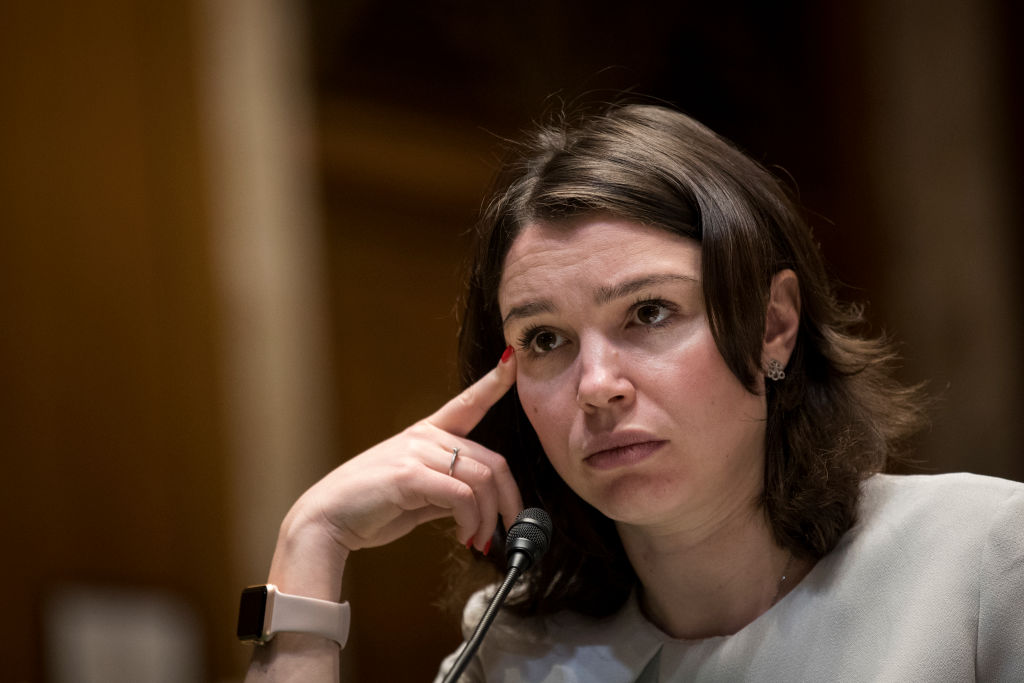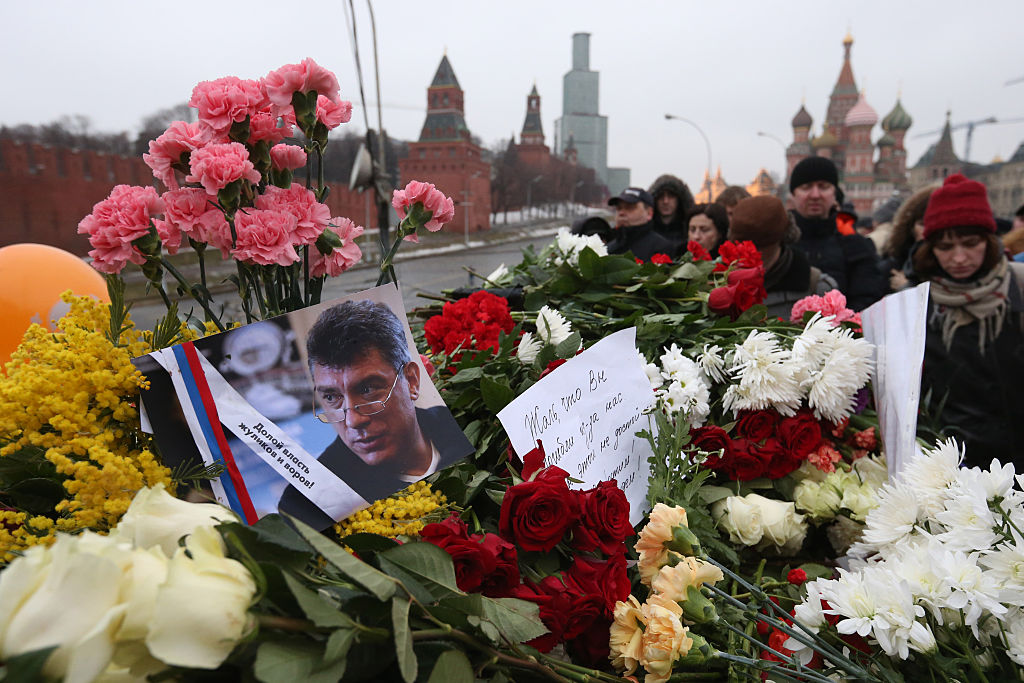
Not far from the Kremlin, people lay fresh flowers and candles at the edge of the bridge. It’s the site where Boris Nemtsov, one of Russia’s most prominent critics of Vladimir Putin, was killed exactly four years ago. Just before midnight on Feb. 27, 2015, the 55-year-old Nemtsov was crossing the Bolshoy Moskvoretsky Bridge with his girlfriend when he was shot several times from behind. (She survived, the only eyewitness to the assassination.)
Supporters say they are still waiting for justice. A trial held in Moscow that ended in 2017 with five Chechen men convicted for Nemtsov’s murder was condemned by Nemtsov’s lawyer Vadim Prokhorov and human rights activists as a cover-up that left the real organizers of the attack unpunished.
Nemtsov is one of many Kremlin critics who have been murdered, or who have died in highly suspicious circumstances, and whose cases are still unsolved. They include exile Nikolai Glushkov, oligarch and political exile Boris Berezovsky, human rights activist Nastya Estimerova, investigative journalist Anna Politkovskaya and former FSB officer Alexander Litvinenko.
Speaking to TIME in late February over the phone from her home in Germany, Nemtsov’s daughter Zhanna Nemtsova, 34, expressed her anger that her father’s murderers have not been held to account. “In his last few years, as the regime got tougher, I knew imprisonment was possible,” she says. “But never this brutal murder.”
The Russian government has intensified its crackdown on political opposition and peaceful protesters since 2012 anti-government protests that led to tens of thousands of people taking to the streets to condemn ballot-rigging. In the last couple of years, the Russian parliament has passed laws further curbing freedom of online expression and the media. Authorities have reportedly harassed political and civic activists and increased prosecution for online speech. According to Human Rights Watch, Russian police “systematically interfered with the presidential campaign of the opposition politician” and anti-corruption activist, Alexei Navalny.
After receiving death threats, Nemtsova left Russia for Germany in 2015, where she now works as a journalist at Deutsche Welle. She says the investigation into her father’s murder was blocked by high-ranking politicians, who put pressure on the investigative team not to research it objectively. “The organizers have not been identified, found and brought to justice,” she says. “The motive behind the killing, obviously political, hasn’t been officially acknowledged.”
But she believes the international community can help, mentioning a clause in U.S. Senate legislation on countering “Kremlin’s aggression,” not yet passed, that would allow the U.S. to start investigating her father’s case. Last July, the Organization for Security and Cooperation in Europe also passed a resolution urging the Russian authorities to undertake a new, thorough investigation of the murder.
Lawyers representing Nemtsov claim the trail of evidence leads to senior figures in Chechnya, who are loyal to Putin. Ramzan Kadyrov, Chechnya’s president and Putin’s ally, defended Zaur Dadayev, a former member of Kadyrov’s elite military unit who was found guilty of shooting Nemtsov, describing him as “a true patriot” and his accomplices “completely innocent.” He pointed the finger at “Western intelligence agencies,” alleging they murdered the politician to destabilize Russia.

Nemtsov was among the first pro-democracy politicians in post-Communist Russia, rising from a provincial governor to deputy prime minister under President Boris Yeltsin in the 1990s. Having earned a reputation as a leader in market reform and economic modernization, many Russians considered the liberal politician a likely successor to Yeltsin.
But in the 2000s, Nemtsov began criticizing the Putin regime, denouncing the rollbacks in democracy, ‘dead-end’ politics and Putin’s mismanagement of the economy. He called for reduced military spending and an increase in social spending. He also criticized the “rampant corruption” ahead of the 2014 Sochi Winter Olympics. When conflict broke out in eastern Ukraine in 2014, he sought to expose Putin’s undercover military support for separatist rebels in the East, which the Kremlin had vehemently denied.
More than a dozen politicians and journalists have been killed in post-Soviet Russia. Investigations have halted after prosecuting the alleged hit-men; in some cases, even the hit-men are not identified or punished, according to Tanya Lokshina, the Europe and Central Asia associate director at Human Rights Watch. “Unless the masterminds are brought to account, the justice is not done,” she says. After the 2006 shooting of Anna Politkovskaya, a journalist who exposed Russian war crimes in Chechnya, two men were sentenced to life in prison. But no one has ever been prosecuted for ordering the hit. (Politkovskaya’s supporters claim that Kadyrov was behind the murder.)
Russia is at its most repressive since the Soviet era, Lokshina says. Nemtsova agrees, saying “it has never been more dangerous to be a political critic.” She points to the case of activist Anastasia Shevchenko, the first person prosecuted under Russia’s “undesirable organizations” law. The controversial 2015 law, which built on 2012 legislation, gives prosecutors the power to shut down international organizations and punish its members with heavy fines or even jail time. Since 2012, more than 100 organizations have suffered a shrink in funding and 27 have shut down altogether.
Shevchenko was placed under house arrest in January in connection with her work at the human rights group Open Russia. If convicted, she faces up to six years in prison. In January, Amnesty International said “the authorities are expanding their toolkit for imprisoning human rights defenders and activists” and said Shevchenko’s case sets an “extremely troubling” precedent.
“The government is afraid of everything and is desperate to remain in power. Now, it’s trying to create a so-called isolated sovereign Internet,” Nemtsova says. In January, Putin proposed a law on Internet “sovereignty” that would enable Russian Internet to operate independently from the global Internet in an emergency or when faced with a foreign threat.
Critics of the law believe it is an effort to censor online content. With the state controlling most traditional media, Kremlin opponents and activists have turned to the Internet to organize rallies and scrutinize state news. Civil rights activists say the government has sought to silence critics online and on social media through a variety of restrictions, compounded with vaguely-worded “anti-extremism” legislation. According to Human Rights Watch, 762 “extremist” crimes were registered in 2018, many consisting of social media posts that range from political to simply “absurd.”
As a way of continuing her father’s legacy, Nemtsova created The Boris Nemtsov Foundation in November 2015. The Germany-based organization gives support to political prisoners and activists in Russia, providing education, training and funding. “I share my father’s political convictions. I value freedom and independence,” Nemtsova says. “My father never changed his principles and beliefs no matter what his position. That’s the main pillar of his political legacy, along with his incredible courage.”
More Must-Reads from TIME
- Cybersecurity Experts Are Sounding the Alarm on DOGE
- Meet the 2025 Women of the Year
- The Harsh Truth About Disability Inclusion
- Why Do More Young Adults Have Cancer?
- Colman Domingo Leads With Radical Love
- How to Get Better at Doing Things Alone
- Michelle Zauner Stares Down the Darkness
Contact us at letters@time.com